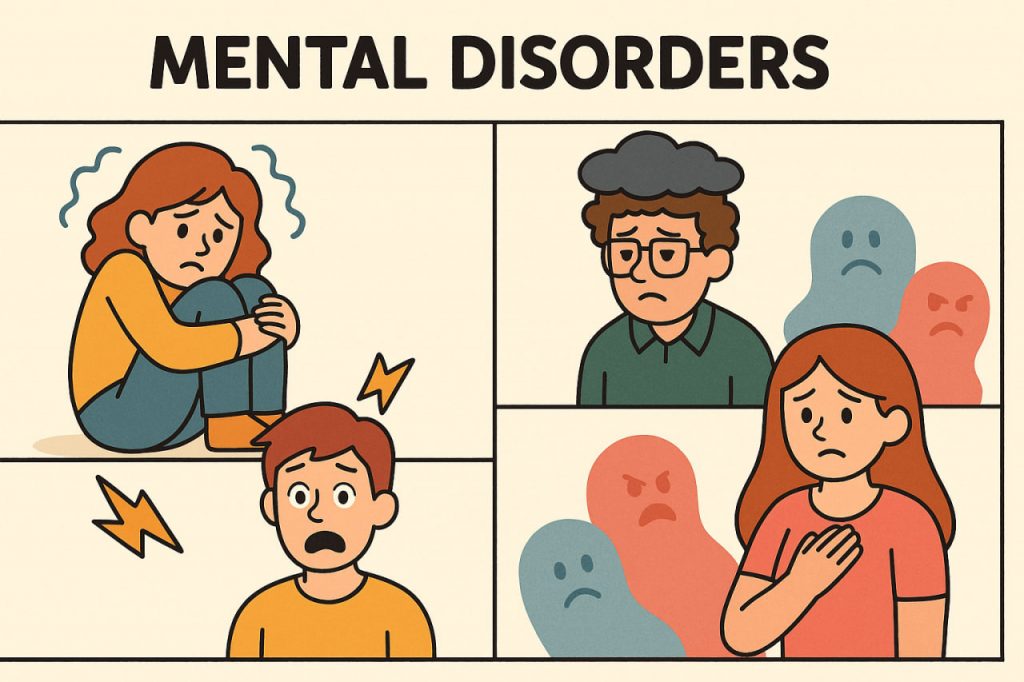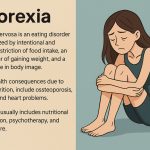Mental disorders are conditions that affect a person’s thinking, emotions, behavior, and overall functioning in daily life. They range from mild to severe and can influence relationships, work, and physical health. These disorders are widespread, and millions of people around the world experience them at some point in their lives. Despite stigma, mental disorders are medical conditions that can be treated and managed with professional care. Understanding the most common types is essential for awareness and early intervention.
Anxiety Disorders
Anxiety disorders are among the most common mental health conditions. They include generalized anxiety disorder (GAD), panic disorder, social anxiety disorder, and specific phobias. People with these conditions often experience excessive fear, worry, or nervousness, even when no real danger is present. Symptoms may include rapid heartbeat, restlessness, and difficulty concentrating. Although anxiety can be a normal response to stress, chronic anxiety interferes with daily functioning. Professional guidance is necessary to manage these disorders effectively.
Depression
Depression is a major mental disorder that affects mood, energy, and motivation. It goes beyond temporary sadness, often lasting weeks or months. Symptoms include persistent hopelessness, loss of interest in activities, fatigue, and changes in appetite or sleep. Severe cases can lead to thoughts of self-harm. Depression is caused by a combination of biological, psychological, and social factors. With proper diagnosis and support, people can recover and improve their quality of life.
Bipolar Disorder
Bipolar disorder is characterized by extreme mood swings, shifting between episodes of mania and depression. During mania, individuals may feel euphoric, have excessive energy, or engage in risky behavior. In depressive phases, they may experience deep sadness and lack of motivation. These cycles can severely disrupt personal and professional life. Bipolar disorder requires long-term management with the help of medical professionals. Recognizing the pattern of mood changes is crucial for timely treatment.
Schizophrenia
Schizophrenia is a severe mental disorder that affects perception, thinking, and behavior. People with schizophrenia may experience hallucinations, delusions, disorganized speech, and social withdrawal. The condition typically develops in early adulthood and can significantly impact daily life if untreated. While its exact causes are complex, involving genetics and brain chemistry, effective treatment exists. Early intervention and ongoing professional care greatly improve outcomes.
Eating Disorders
Eating disorders, such as anorexia nervosa, bulimia nervosa, and binge-eating disorder, involve unhealthy relationships with food and body image. These conditions can cause severe physical health problems, including malnutrition, heart issues, and digestive disorders. They are not only about eating habits but also about deep psychological distress. Social pressure, genetics, and emotional struggles often contribute to their development. Recovery requires specialized medical and psychological support.
Conclusion
The most common mental disorders—such as anxiety, depression, bipolar disorder, schizophrenia, and eating disorders—affect millions worldwide. They influence both mental and physical health, as well as social relationships. While they may seem overwhelming, these conditions are treatable with proper care. Awareness, early diagnosis, and professional guidance play key roles in recovery. Reducing stigma and promoting open discussions about mental health are essential for healthier societies.
Glossary
- Mental disorders – conditions that affect emotions, behavior, and thinking.
- Anxiety disorders – disorders characterized by excessive fear and worry.
- Generalized anxiety disorder (GAD) – persistent, uncontrollable worry about everyday matters.
- Depression – a mood disorder involving persistent sadness and loss of interest.
- Bipolar disorder – a condition with alternating episodes of mania and depression.
- Schizophrenia – a severe disorder marked by hallucinations, delusions, and disorganized thinking.
- Eating disorders – psychological conditions that affect eating habits and body image.


